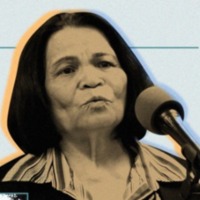
Lydia
There are an estimated 403,000 people living in conditions of modern slavery in the United States (GSI 2018). The US attracts migrants and refugees who are particularly at risk of vulnerability to human trafficking. Trafficking victims often responding to fraudulent offers of employment in the US migrate willingly and are subsequently subjected to conditions of involuntary servitude in industries such as forced labour and commercial sexual exploitation. Lydia Catina-Amaya was recruited as a missionary for a church in the Philippines and was brought to the United States under the auspices of helping the church raise money. She spent some years as a personal assistant for church members and then was given a position as a domestic worker for the director of the church. She ran away from a forced domestic labour situation, staying with friends in Chicago, where she met her husband. He later helped connect her with Damayan Migrant Workers Association, a grassroots migrant workers’ association in New York led by and for Filipina workers. When she told her story at the age of 46 in 2017, she was working as a community organizer with Damayan. The narrative also responds to a 2017 article in the Atlantic, "My Family's Slave," that told the story of Eudocia "Lola" Tomas Polido, a woman enslaved in the Philippines and then in the United States.

Judith
There are an estimated 403,000 people living in conditions of modern slavery in the United States (GSI 2018). The US attracts migrants and refugees who are particularly at risk of vulnerability to human trafficking. Trafficking victims often responding to fraudulent offers of employment in the US migrate willingly and are subsequently subjected to conditions of involuntary servitude in industries such as forced labour and commercial sexual exploitation. Judith Dulaz left her family in the Philippines for the US in 2005. She began working as a domestic worker for a Japanese diplomat’s family in New York. She was promised $1800 per month, paid holidays and other benefits but, in reality, she worked up to 18 hours per day and received $500 per month. Judith provided full-time childcare and also was responsible for all the cooking and cleaning. Her employers held her passport and she was subject to physical abuse by her employers. Judith escaped in 2006 and later was connected with the Damayan Worker Cooperative through a friend. She recently reunited with her family, including her four children, in the US after ten years. She was 50 years old when she told her story in 2017.

Judith Daluz
There are an estimated 57,700 people in modern slavery in the US according to GSI estimates. The US attracts migrants and refugees who are particularly at risk of vulnerability to human trafficking. Trafficking victims often responding to fraudulent offers of employment in the US migrate willingly and are subsequently subjected to conditions of involuntary servitude in industries such as forced labour and commercial sexual exploitation. In 2005 Judith was living in the Philippines when her sister told her about a job in New York working for a diplomat family. While her sister warned her that the advertised income was just for show, it was still more than Judith could make in the Philippines and she decided to go. Upon arrival, her passport was confiscated, she was forced to work 14 to 18 hours a day, seven days a week with no rest. Judith was deprived of food and subjected to verbal abuse. Judith finally escaped on July 26th 2007.

Nena Ruiz
There are an estimated 57,700 people in modern slavery in the US according to GSI estimates. The US attracts migrants and refugees who are particularly at risk of vulnerability to human trafficking. Trafficking victims often responding to fraudulent offers of employment in the US migrate willingly and are subsequently subjected to conditions of involuntary servitude in industries such as forced labour and commercial sexual exploitation. Nena Ruiz was in the Philippines struggling for money after her business partner stole all of her savings when her cousin told her about a job in the United States. She was told that she would be assisting her employer's elderly mother, however upon arrival in San Francisco, she was informed that she would be working as a domestic helper in Los Angeles. Nena was flown to L.A. and her passport was confiscated by her new employer. She was forced to work long hours with no rest and was subjected to physical abuse. Nena was finally able to escape her situation when her neighbours called the police.

Czar
Australia is a destination country for women from Southeast Asia, South Korea, Taiwan, the People’s Republic of China (PRC), and reportedly Eastern Europe trafficked for the purpose of commercial sexual exploitation. Some men and women from several Pacific islands, India, the PRC, South Korea, the Philippines, and Ireland are fraudulently recruited to work temporarily in Australia, but subsequently are subjected to conditions of forced labour, including confiscation of travel documents, confinement, and threats of serious harm. Some indigenous teenage girls are subjected to forced prostitution at rural truck stops. Czar flew to Sydney from the Philippines on the promise of a successful boxing career. However, upon arrival Czar was forced to hand over his passport and was told he would be working as a cleaner in the mornings and evenings. Czar's work as a cleaner went unpaid and when he did box, his earnings were deducted for visa and travel expenses. Eventually Czar and the other boxers being exploited went to the police who helped them escape.

Shelly A.
The United Arab Emirates is a destination for men and women predominantly from South and Southeast Asia, trafficked for the purposes of labour and commercial sexual exploitation. Migrant workers make up over 90 per cent of the UAE’s private sector workforce and are recruited from India, Bangladesh, Pakistan, Nepal, Sri Lanka, Indonesia, Ethiopia, Eritrea, China, and the Philippines. Though some travel willingly, they are subjected to conditions of modern slavery including withholding of passports, non-payment of wages, restrictions of movement and threats of physical and sexual abuse. Trafficking of domestic workers is facilitated by the fact that normal protections for workers under UAE labour laws do not apply to domestic workers, leaving them more vulnerable to abuse Shelly A. travelled from the Philippines to the UAE for domestic work. Her sponsor forced her to work under the threat of physical abuse and her employer withheld her salary, paying only the initial 3 months but making her sign receipts stating she was in receipt of her salary. Her employer took her passport, confined her to the house and subjected her to physical abuse. Shelly A. filed a criminal case against her employers which has yet to reach an outcome.

Sandra S.
The United Arab Emirates is a destination for men and women predominantly from South and Southeast Asia, trafficked for the purposes of labour and commercial sexual exploitation. Migrant workers make up over 90 per cent of the UAE’s private sector workforce and are recruited from India, Bangladesh, Pakistan, Nepal, Sri Lanka, Indonesia, Ethiopia, Eritrea, China, and the Philippines. Though some travel willingly, they are subjected to conditions of modern slavery including withholding of passports, non-payment of wages, restrictions of movement and threats of physical and sexual abuse. Trafficking of domestic workers is facilitated by the fact that normal protections for workers under UAE labour laws do not apply to domestic workers, leaving them more vulnerable to abuse. Sandra S. travelled from the Philippines to Abu Dhabi through an agency that promised her domestic work with better conditions. However, the contract she signed that contained positive terms convincing her to leave her home, was substituted with the UAE standard contract offering less pay and few rights and protections. Forbidden from speaking to any other Filipinos Sandra S. was forced to sleep on a piece of cardboard. When she ran away and returned to the agency she was punished and deprived of food.

Mitos
The United Kingdom remains a significant destination and, to a lesser extent, transit country for women, men and children trafficked for the purposes of forced labour and commercial sexual exploitation. Migrant workers are trafficked to the UK for forced labour in agriculture, construction, food processing and domestic servitude. The UK National Crime Agency estimates 3,309 potential victims of human trafficking came into contact with the State or an NGO in 2014. The latest government statistics derived from the UK National Referral Mechanism in 2014 reveal 2,340 potential victims of trafficking from 96 countries of origin, of whom 61 percent were female and 29 percent were children. Of those identified through the NRM, the majority were adults classified as victims of sexual exploitation followed by adults exploited in the domestic service sector and other types of labour exploitation. The largest proportion of victims was from Albania, followed by Nigeria, Vietnam, Romania and Slovakia. Mitos travelled from the Philippines to work as a maid abroad. Her employers took her passport and refused to allow her to leave, forcing her to travel to the UK. Upon arrival Mitos was forced to be at her employers call 24 hours a day, often working on only 2 hours sleep. She was verbally abused and prevented from leaving the house at any time. Mitos lived like this for 3 years before she was able to escape.

Angela
Angela Guanzon was brought to the United States from Bacolod City, Philippines, in 2005, to work at an elderly care home in California. But upon arrival she was told she owed $12,000 in fees, to be deducted before wages. She worked 18 hours a day and slept on hallway floors for two and half years. The FBI rescued Angela and several other workers in 2008. Angela testified against her trafficker in criminal court and the woman received a five-year prison sentence. Angela is now a survivor-organizer with the Coalition to Abolish Slavery and Trafficking (CAST), a nonprofit organization that provided her with shelter and legal assistance.